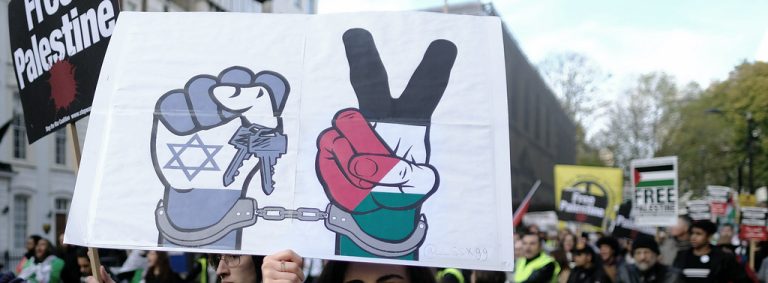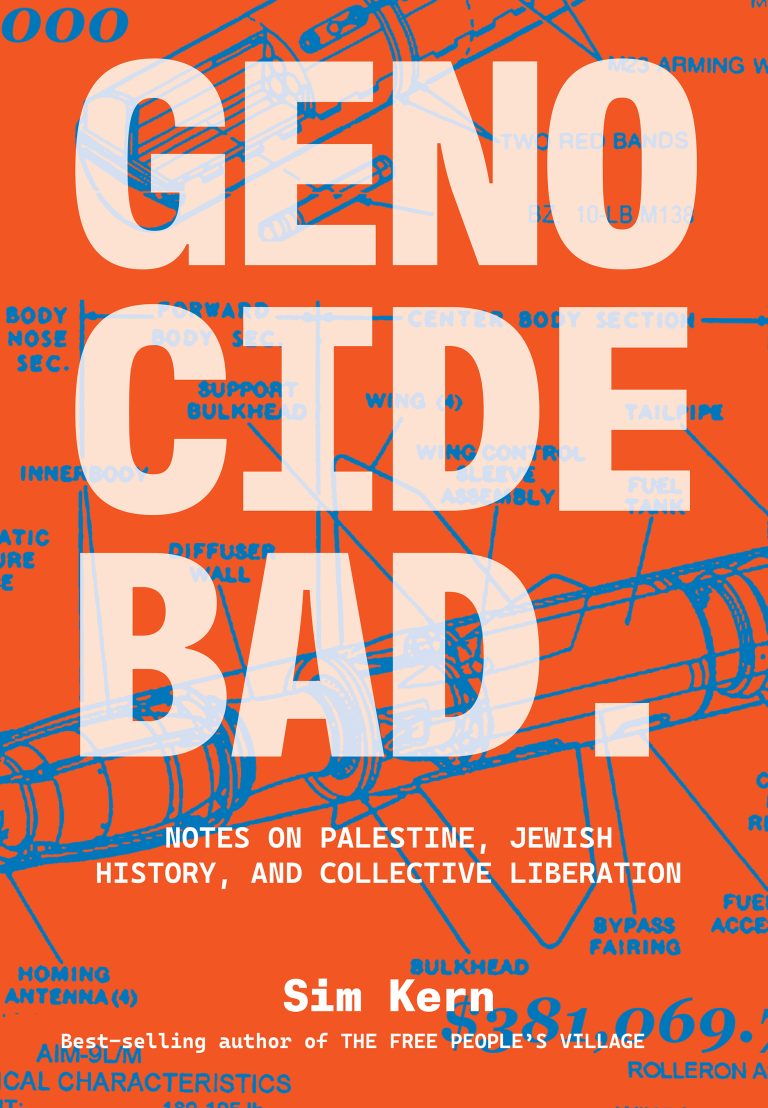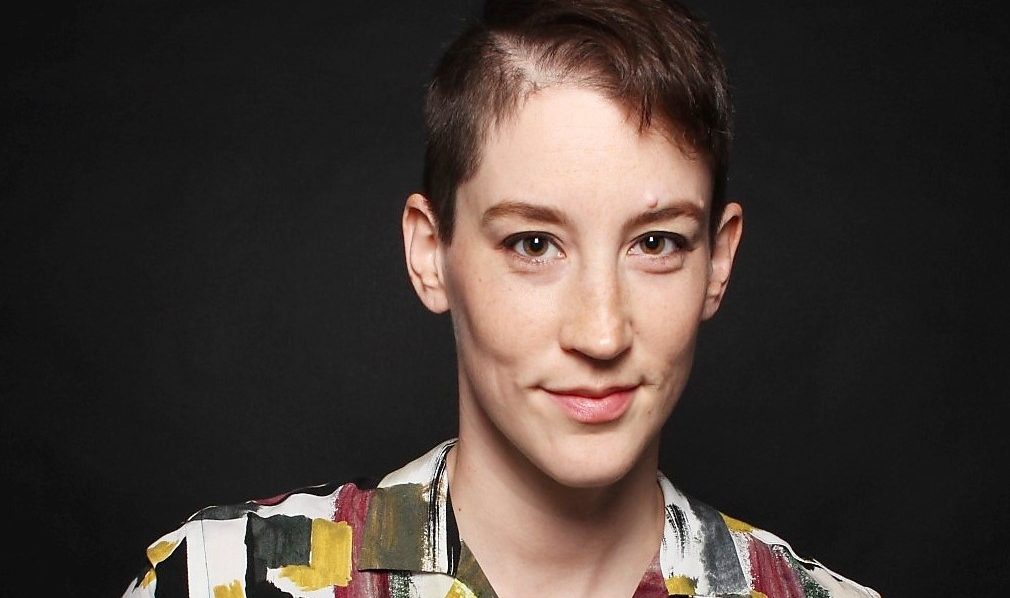The quotes and photos in this article are published with the permission of Sim Kern.
Books have the wonderful power to change our perspectives and deconstruct harmful indoctrination that one may have undergone. In this interview with author Sim Kern, Truthlytics inquired into the motivation behind authoring their latest book, Genocide Bad: Notes on Palestine, Jewish History, and Collective Liberation, and the answers may surprise readers. Genocide Bad is available for pre-order now.
Who is Sim Kern?
In their own words, they are an “anarchist who views history through a Black Marxist lens.” When they say liberation, it is not just about neoliberal reforms, but about collective liberation, which requires “upending the entire global economic and political system.”
Kern is an anti-Zionist Jew, a former teacher, a social media content creator, and an author, with several published books. But, most importantly of all, Kern is a human being with a heart who has a unique perspective and felt the drive to share that with the world.
1. What should readers know about you?
There was some reluctance for Sim to pursue anti-Zionist activism, but as a Jewish person who has witnessed a genocide some claim in the name of Judaism, their basic humanity motivated their activism and writing, despite the death threats they received for it.
“As a kid growing up as a secular Jew in the rural Midwest, I never bought into this idea, pushed on me by Zionist friends and relatives, that Israel is my “homeland.” I just had no interest in the place.”
“But as I grew up, I learned the true nature of the occupation, and I realized that Zionism drags all Jews everywhere into their project of settler colonialism and ethnic cleansing, whether we like it or not. Israel says they’re killing tens of thousands of Palestinians in our name, on our behalf and they do it using the iconography of our religious tradition.”
“If I have a platform, and if I don’t resoundingly say, “No! Stop! GENOCIDE BAD!” then my silence is complicity. So, in part, I create anti-Zionist content on social media, and I’ve written a book called Genocide Bad, to clear my name, because I’m Jewish! But in a much larger part, I’m just a human being with a heart and basic empathy, and I’ve been horrified for many years by the violence, injustice, and degradation of the Israeli occupation of Palestine.”
2. What are your previous books about? And what genres are they?
“All of them fall into the category of Climate Fiction. . . Depart, Depart! is a horror novella, Real Sugar is a book of sci-fi and fantasy short stories, and The Free People’s Village is an alternate-timeline sci-fi novel. But all of them are grappling with these intersections of social justice and climate change.”
“I was always a political writer, but I never thought I’d write a book of nonfiction! Certainly not one about Palestine.”
“But actually, the final scene of The Free People’s Village takes place at a Free Palestine protest. The narrator is chanting “From the River to the Sea, Palestine will be Free!” and she’s ruminating in that last scene on how the police brutality the characters have been facing in the US is connected to the climate crisis is connected to the forced displacement of Palestinian families in Sheikh Jarrah.”
“That book came out in August of 2023, but I had no idea how much more relevant it would become just a few months later, or how it would foreshadow my next book, Genocide Bad.”

3. Have you always wanted to be an author, and what motivates you to keep writing?
With a candid and relatable answer, they said:
“Yes, author was always on the short-list of things I wanted to be as a kid, alongside volcanologist, orchestral violinist, and pop star/president.”
“In college, I studied creative writing and English, hoping to make it as an author, but then I slammed in the real world, where I started teaching and doing freelance journalism on the side, and I had no energy to work on a book-length project. But for the past seven years, I’ve been able to pursue being an author full time, which has been amazing.”
“I don’t have a hard time staying motivated to write, because it’s a compulsion. I have to write daily, because the words, words, words just keep coming, stringing themselves along in my mind whether I like it or not.”
4. What inspired you to write Genocide Bad?
This is a fascinating insight into the creation of this book:
“Hannah Moushabeck, who’s a fabulous Palestinian author I greatly admire, and who’s an editor/owner of Interlink Books, the only Palestinian-owned press in the US, asked me to write this book last spring.”
“Hannah had seen my videos on social media, making connections between Jewish history and the Palestinian present, and wanted me to reformat that content in an essay collection.”
“How could I say no? She thought my ideas might be useful to help others deconstruct Zionism. I couldn’t walk away from that. I was incredibly honored, though I knew it would be a grueling process.”
“Who wants to write about genocide? We don’t do this kind of work because we want to, but because it’s important, and if we’re called to it and we’re grown-ups, then we have to answer that call.”
5. What do you hope readers will gain from reading Genocide Bad?
“I tried to reach two audiences simultaneously with this book. On the one hand, I genuinely hope it helps people who may not even realize that they’re Zionists to deconstruct Zionism.”
“I hope rebellious teenage Jewish kids will pick it up at first just to spite their Zionist parents–but by the final page, they’ll find themselves deeply committed to ending Israeli apartheid and occupation.”
“But I also know that the majority of people who pick up this book are already going to be committed anti-Zionists or followers of my content. So, for them, the book is designed to arm [them] with rhetorical tools to fight Zionist propaganda. The book helps you avoid getting tripped up by both common Israeli talking points and well-meaning pitfalls on the left.”
“I hope people close the back cover feeling fired-up to start difficult conversations and use their own words and actions to advocate for Palestinian and collective liberation.”

6. What makes this book unique compared to other books on the topic?
A difficult question for many authors to answer, but Sim was armed with an eloquent and understandable response. By now, they are immune to “Zionist pearl-clutching” and “don’t pull any punches or leave apt historical lessons unexamined.” Genocide Bad makes direct comparisons between Jewish history and the Palestinian present, comparing settler-colonialism, apartheid, and genocides worldwide to Gaza.
“This book is a true collaboration between a Jewish author, a team of Palestinian and Jewish editors, a Palestinian press, and Palestinian scholars who consulted on fact-checking.”
“Should a Jewish-Palestinian collaboration be necessary for folks to realize that “Genocide Bad”? No, but “should” doesn’t matter.”
“For some people, a book like this is necessary for them to seriously question their biases and racism towards Palestinians. Some people won’t pick up a book about Palestine unless it’s by a Jewish-Palestinian team.”
“Thanks to Zionism, global Jewish and Palestinian destinies are now inextricably intertwined, and in my opinion, Jews of conscience have an obligation to show up to the fight for justice–which is the only path to peace.”
“This book, while it contains scholarship, is not what I’d call “academic.” I wrote it to be extremely accessible, down-to-earth, and aimed towards younger generations. I included cussing purposefully, as a rejection of the norms of the “respectable” journalism and scholarship which have aided and abetted this disgusting genocide.”
“Shocking language should be used to discuss shocking atrocities. Writing about genocide should be emotional and full of profound grief and fury. Polite rhetorical restraint is abhorrent to me when the topic is mass murder.”
8. How do you handle criticism for your writing, activism, or social media presence?
“I make very free use of the block button. No one is entitled to viewing and providing input on my content if they’re going to be a jerk.”
“And look, I welcome fact-corrections and well-meaning criticisms! There have been times over the past year I’ve realized I was wrong about something, and I’ll say it! I’ll issue a correction. I’ll apologize for a bad take.”
“But when you’re on social media and you get continually bombarded by hate, and even death threats, parsing well-meaning criticism from paid hasbarist slander can be impossible.”
9. Where can readers find and purchase Genocide Bad?
Folks in the US are encouraged to buy directly from Interlink Press, which is the only Palestinian-owned publishing company in the US. The book is available for pre-order now.
Readers have the option of purchasing a paperback for a lower price-point, or a fancy, limited edition, deluxe hardcover, which will come signed by the author. 10% of the proceeds for the hardcover will be donated to the Middle East Children’s Alliance.
As of now, international distribution is not available, but independent bookstores worldwide have stepped up to manage shipping logistics. Readers can find a bookstore near them to pre-order.





